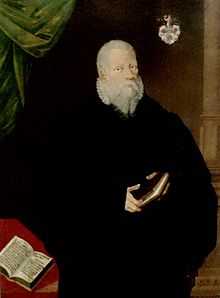Ludwig Helmbold
| Ludwig Helmbold | |
|---|---|
 | |
| Born |
January 21, 1532 Mühlhausen |
| Died | April 8, 1598 (aged 66) |
| Nationality | German |
| Occupation | Poet, philosopher and ecclesiastical minister |
| Known for | Lutheran hymns |
Ludwig Helmbold, also spelled Ludwig Heimbold, (21 January 1532 – 8 April 1598) was a poet of Lutheran hymns.[1] He is probably best known for his hymn "Nun laßt uns Gott dem Herren", of which J. S. Bach used the fifth stanza for his cantata O heilges Geist- und Wasserbad, BWV 165; Bach also used his words in BWV 73, 79 and 186a.
Biography
Helmbold was born in Mühlhausen. He became a professor of Philosophy an der Erfurt University in 1554. In 1571 he was appointed a minister at the Marienkirche in Mühlhausen, later as Superintendent.[2]
Helmbold was crowned poeta laureatus by Maximilian II, Holy Roman Emperor, in 1566 on the Reichstag at Augsburg.[2]
The Mühlhausen cantors Joachim à Burck and Johannes Eccard set many of his more than hundred chorales to music. Some of his works were used by Johann Sebastian Bach in his cantatas, such as
- Herr, wie du willt, so schicks mit mir, BWV 73
- Gott der Herr ist Sonn und Schild, BWV 79
- Ärgre dich, o Seele, nicht, BWV 186a
- O heilges Geist- und Wasserbad, BWV 165.
A few of his songs are still included in the German Protestant hymnal Evangelisches Gesangbuch.
In 1998, a street named Helmboldstraße, next to Bonatstraße, was named after him in Mühlhausen.
References
- ↑ Schweitzer, Albert. Die Orgelwerke Johann Sebastian Bachs: Vorworte zu den "Sämtlichen Orgelwerken". Georg Olms Verlag. p. 135. ISBN 978-3-487-41697-7.
- ↑ 2.0 2.1 "Ludwig Helmbold (Hymn-Writer, Composer)". bach-cantatas.com. 2006. Retrieved 2010-07-15.
Literature
- Waldtraut-Ingeborg Sauer-Geppert (1969), "Helmbold, Ludwig", Neue Deutsche Biographie (NDB) (in German) 8, Berlin: Duncker & Humblot, pp. 492–493, (full text online)
- Heinrich Julius Kämmel (1880), "Helmbold, Ludwig", Allgemeine Deutsche Biographie (ADB) (in German) 11, Leipzig: Duncker & Humblot, pp. 701–702
- Friedrich Wilhelm Bautz (1990). "Helmbold, Ludwig". In Bautz, Friedrich Wilhelm. Biographisch-Bibliographisches Kirchenlexikon (BBKL) (in German) 2. Hamm: Bautz. cols. 705–706. ISBN 3-88309-032-8.
External links
| Wikimedia Commons has media related to Ludwig Helmbold. |
- Literature by and about Ludwig Helmbold in the German National Library catalogue
- Entries for Ludwig Helmbold on WorldCat
|